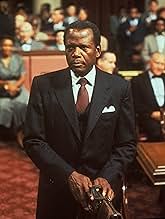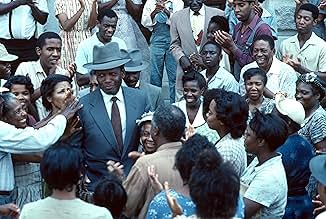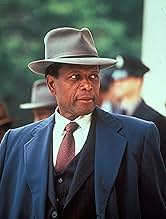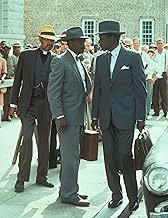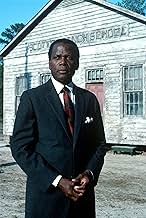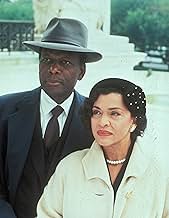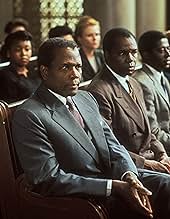A dramatization of the American court case that destroyed the legal validity of racial segregation.A dramatization of the American court case that destroyed the legal validity of racial segregation.A dramatization of the American court case that destroyed the legal validity of racial segregation.
- Won 2 Primetime Emmys
- 3 wins & 12 nominations total
Browse episodes
Featured reviews
It is educational...and as someone that works in history, I can see a teacher wanting to be lazy and using "Separate But Equal" as an excuse for it...
...but I doubt I'd ever do it. I'd want my students to form an interest in movies based on historical events.
I don't know what Poitier was thinking. Watching the mini-series anyone that read the script should have instantly gotten that "made for TV crap" vibe off it.
I gave it 5 stars. I mean, I can sit down and watch and enjoy it...but I can also read and enjoy Herzen's autobiography. I am a freak of nature that can enjoy some horribly dull things.
It's not only impossible to shake that made-for-TV vibe...but on top of it, it feels like you're watching a Lifetime Original Movie.
If you can deal with that, it's worth a watch. Otherwise there are Civil Rights movies that actually know how to make such a dramatic part of American History actually dramatic on the screen.
...but I doubt I'd ever do it. I'd want my students to form an interest in movies based on historical events.
I don't know what Poitier was thinking. Watching the mini-series anyone that read the script should have instantly gotten that "made for TV crap" vibe off it.
I gave it 5 stars. I mean, I can sit down and watch and enjoy it...but I can also read and enjoy Herzen's autobiography. I am a freak of nature that can enjoy some horribly dull things.
It's not only impossible to shake that made-for-TV vibe...but on top of it, it feels like you're watching a Lifetime Original Movie.
If you can deal with that, it's worth a watch. Otherwise there are Civil Rights movies that actually know how to make such a dramatic part of American History actually dramatic on the screen.
7=G=
Recently, four states celebrated the 50th anniversary of a 1954 American Supreme Court landmark decision which struck down the long standing "separate but equal" status for racially divided public schools in a finding against public school racial segregation. The case for desegregation was argued by Thurgood Marshall (Poitier) - founder of the NAACP's Legal Defense Fund who later became the first black Supreme Court justice - before nine Supreme Court justices presided over by Chief Justice Earl Warren (Kiley). Though the federal trial represented a collective consideration of trials in the four states (SC, KS, VA, and DW), this 3 hour, 2 part TV miniseries docudrama focuses on the South Carolina case (Briggs et al. v. Elliott et al.) in Part 1 and the Supreme Court trial in Part 2. "Separate but Equal" has little to offer save its historical significance as it dwells mostly on the legal dialectic at work during this benchmark in the genesis of racial equality in America. Good viewing for anyone with a general interest in the history of racial issues in America or a specific interest in the NAACP or the Supreme Court. (B)
10Vegita
Separate but Equal is a great movie depicting the tragedy of the time of racial segregation in schools and the steps which these men from the NAACP took to correct it. The movie has great acting and intense speech emotion but sinks into the wordiness and vocabulary which lawyers and judges use and leaves the audience scratching their heads or reading the dictionary. Nevertheless, the movie has great speeches and facts as well as events suitable in a history-documentary. Great movie to sit by and try to teach yourself to be a lawyer.
This movie was really good, but it was really draggy and it could have been finished in one video instead of two. There were a lot of unnecessary talking and scenes, but it was still a very educational movie. 2½ stars out of 5.
Sidney Poitier was the perfect actor to play Thurgood Marshall as an attorney for the NAACP in the fifties. Burt Lancaster gives a final performance but one of his best as legal legend, John W. Davis. The supporting cast is excellent. This mini series is about the legal process that can be long, tedious, and time consuming for years. This case starts off when a small town African American minister, teacher, and principal seeks a school bus for his students. When the superintendent blows off the request, the minister goes forward and seeks counsel. The minister and the plaintiffs experience hostility, threats, violence, and more hatred. This film has to be shown in schools to understand American history, a shameful chapter in history.
Did you know
- TriviaThis was Burt Lancaster's final performance. On November 30, 1990, shortly after filming ended, he suffered a massive stroke and remained incapacitated for the final four years of his life.
- GoofsThe entire movie is set in the 1950s, but in at least one of the New York City street scenes, both the pedestrians' clothing and the cars on the street appear to date from the late 1960s to the 1970s.
- ConnectionsFeatured in The 43rd Annual Primetime Emmy Awards (1991)
- How many seasons does Separate But Equal have?Powered by Alexa
Details
Contribute to this page
Suggest an edit or add missing content


